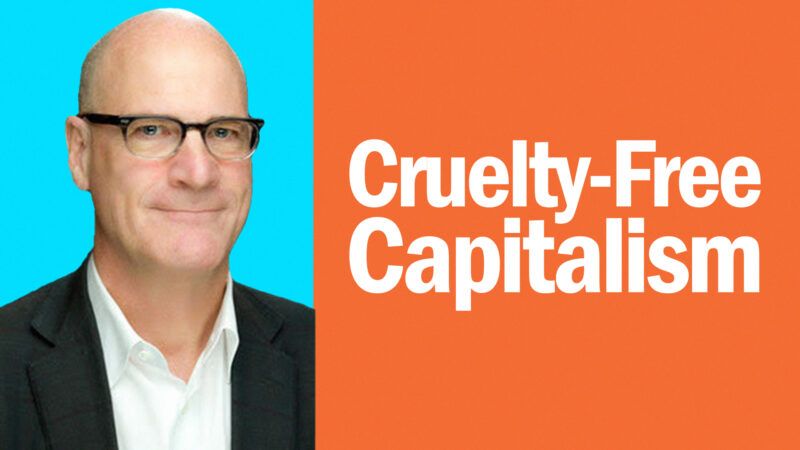Grant McCracken: The Rise of Artisanal Everything and 'Cruelty-Free Capitalism'
In Return of the Artisan, anthropologist Grant McCracken explains how we've shifted from an industrial to a handmade economy.

"I think you could argue that Alice Waters changed us almost as much as Steve Jobs did, almost as much as Chairman Mao did. I mean, it's extraordinary to see what follows from her creation of a tiny restaurant in Berkeley in 1971," says anthropologist Grant McCracken. "The artisanal revolution ushers in a new model of production and consumption. At its best, it ushers in a cruelty-free capitalism or aims for something like that."
Steve Jobs, Mao, and…Alice Waters? Who is she, exactly?
I'll get to that in a moment, but first, let me ask you a question: While you're hanging out in your hip, handmade loungewear, sipping your pot-still bourbon, and noshing on some homemade sourdough bread covered with butter you churned yourself from your neighbor's stash of unpasteurized goat milk, did you ever stop to wonder just how you—and America writ large—got to a place where Wonder Bread is a shorthand for all that is terrible and mediocre and any sort of super-rustic, craggy, unsliced, dense, dark loaf of barely processed grain is a sign not just of cultural sophistication but of moral superiority?
Only a generation or two ago—for our parents and grandparents—the cutting edge of consumption was to buy the most industrial, machine-made products you could afford, preferably objects that had never been touched by human hands and carried a brand insignia that conveyed high status or value. When it came to even white-collar jobs, the dream was often to dress exactly like everybody else and work for a giant corporation that was bigger than the market and, thus, could guarantee you a job for life. You died and went to heaven if you were an IBM salesman, all of whom wore blue suits, white shirts, red ties, and black shoes.
But now we live in an artisanal age, where everything is small-batched and hyper-personalized. This revolution has been building for years or even decades, and now it is everywhere around us, influencing not just what we wear, eat, and listen to but how we work, where we live, and how we think of our deepest identities. Mass production, including of personalities and social types, is out, and individualization is in.
In Return of the Artisan, anthropologist Grant McCracken explains "how America went from industrial to handmade" in the post–World War II era. This is a funny, deep, and well-written book that takes us to small towns and hipster neighborhoods all over the country, from New York City to Bowling Green, Kentucky, to Berkeley, California, where Alice Waters changed everything when she opened up a revolutionary new restaurant called Chez Panisse.
There's no better guide to this brave new—and sometimes incredibly annoying—world than McCracken, a Baby Boomer raised in British Columbia during the 1960s and an early theorist of how the digital revolution and rise of the internet were remaking us in ways that are mostly better but also deeply challenging to community. His own life is as long and strange a trip as the one he documents in Return of the Artisan.
Previous Reason interviews with and select articles by Grant McCracken:
"Is America Too Forgiving? The Case of Lance Armstrong," February 20, 2021
"Grant McCracken: The New Honor Code vs. Radical Wokeism," February 3, 2021
"How To Have a Good Idea: A unified theory of fantasy football; Eat, Pray, Love; and Burning Man," December 2012
"How Cultural Innovation Happens: Q&A with Anthropologist Grant McCracken," June 7, 2011
"The Politics of Plenitude," August/September 1998
Today's sponsors:
- Everyday Dose is the coffee alternative I start my days with. It's made from nonpsychedelic mushrooms, collagen, and nootropics that elevate my mood, sharpen my focus, and give me an energy boost, all without the jitters and digestive issues that come with drinking traditional coffee. It tastes great too and is quick and easy to make. Try risk-free, with a 60-day, money-back guarantee by going here now.
- The Reason Rundown With Peter Suderman. Free minds. Free markets. Big stories. That's The Reason Rundown, which comes out every Friday. End the week with concise, thought-provoking stories from the journalists at Reason, the magazine of logic, not legends; coherence, not contradictions. Hosted by Features Editor Peter Suderman, in each episode he talks to a single Reason journalist about a single big story. Subscribe today.

Show Comments (91)